- Home
- Ernest Hemingway
Islands in the Stream Page 40
Islands in the Stream Read online
Page 40
They were underway at daylight and Gil, who had the best eyes, was watching the green shore line with the twelve-power glasses. They were close enough to shore for him to see a cut mangrove branch. Thomas Hudson was steering. Henry was watching out to sea. Willie was backing up Gil.
“They’re past this part, anyway,” Willie said.
“But we have to check,” Ara said. He was backing up Henry.
“Sure,” Willie said. “I was just commenting.”
“Where’s that Dawn Patrol from that damned Molasses ship at Cayo Francés?”
“They don’t patrol on Sundays, do they?” Willie asked. “This must be a Sunday.”
“There’s going to be a breeze,” Ara said. “Look at the cirrus.”
“I’m afraid of one thing,” Thomas Hudson said. “That they’ve gone in through the pass at Guillermo.”
“We’ll have to see.”
“Let’s hook the hell up and get there,” Willie said. “This is getting on my nerves.”
“That’s the impression I get sometimes,” Henry said.
Willie looked at him and spat over the side. “Thank you, Henry,” he said. “That’s the impression I wish to give.”
“Break it up,” Thomas Hudson said. “See that big coral head to starboard that’s just awash? That’s what we have to not hit. On the inside, gentlemen, is Guillermo. See how green she is and full of promise?”
“One more goddam key,” Willie said.
“Can you make out any smoke from charcoal burning?” Thomas Hudson asked.
Gil swept it very carefully and said, “No, Tom.”
“The way it rained last night there wouldn’t be any smoke,” Willie said.
“You’re wrong for once, boy,” Thomas Hudson said.
“Maybe.”
“No. It could rain like hell all night and not put one of those big burnings out. I’ve seen it rain three days and hardly bother one.”
“You know more about them than me,” Willie said. “OK, there could be smoke. I hope there is.”
“That’s a bad shoal,” Henry said. “I don’t believe they could run in those squalls along here.”
In the morning light they could see four terns and two gulls working around the shoal. They had found something and were diving. The terns were crying and the gulls were screaming.
“What are they into, Tom?” Henry asked.
“I don’t know. It looks like a school of bait fish that is too deep for them to work.”
“Those poor bastard birds have to get up earlier in the morning than we do to make a living,” Willie said. “People don’t appreciate the work they put in.”
“How are you going to run, Tom?” Ara asked.
“Just as close in to the bank as I can and right up to the head of the key.”
“Are you going to check that half-moon key with the wreck?”
“I’ll make a turn around it close in and everybody glass it. Then I’ll anchor in the bight inside the tip of Guillermo.”
“We’ll anchor,” Willie said.
“That’s implied. Why do you get so ornery this early in the morning?”
“I’m not ornery. I’m just admiring the ocean and this beautiful coast Columbus first cast his eyes on. I’m lucky I didn’t serve under that Columbus.”
“I always thought you did,” Thomas Hudson said.
“I read a book about him in the hospital at San Diego,” Willie said. “I’m an authority on him and he had a worse fucked-up outfit than this one.”
“This isn’t a fucked-up outfit.”
“No,” said Willie. “Not yet.”
“OK, Columbus boy. Do you see that wreck that bears about twenty degrees to starboard?”
“That’s for your starboard watch to see,” Willie said. “But I can see it OK with my one eye that works and there is a booby bird from the Bahamas perched on it. He’s probably come to reinforce us.”
“Good,” said Thomas Hudson. “He’s what we need.”
“I probably could have been a great ornithologist,” Willie said. “Grandma used to raise chickens.”
“Tom,” Ara said. “Do you think we can work a little closer in? The tide is high now.”
“Sure,” Thomas Hudson answered. “Ask Antonio to get up in the bow and let me know how much water I have.”
“You’ve got plenty of water, Tom,” Antonio called. Right in to shore. You know this channel.”
“I know. I just wanted to be sure.”
“Do you want me to take her?”
“Thanks,” said Thomas Hudson. “I do not.”
“Now we can see the high ground beautifully,” Ara said. “You take all of her, Gil. I’ll just back you up. Glass her really well.”
“Who takes the first quarter of the sea?” Willie asked. “How come you switched on me, anyway?”
“When Tom asked you to look at the wreck. We switch automatically. When you went to starboard I went to port.”
“That’s too nautical for me,” Willie said. “When you want to be nautical, be right or not at all. Why don’t you say right or left the same as in steering?”
“It was you who said the starboard watch,” Henry said.
“That’s right. And from now on I’m going to say downstairs and upstairs and the front and the back of the boat.”
“Willie, get over with Gil and Ara and glass the beach, will you please?” Thomas Hudson said. “The beach and carry it up to the first third of the key.”
“Yes, Tom,” Willie said.
It was easy to see if there was anyone living on Cayo Guillermo on this which was the windward side for nearly all of the year. But there was nothing showing as they moved close in along the coast. They came abeam of the point and Thomas Hudson said, “I’ll circle the half-moon key as close as I can and you all glass it. If you notice anything we can stand by and put the dinghy in.”
The breeze was starting to rise and the sea was beginning to move but it did not break yet on the shoals because of the high tide. Thomas Hudson looked ahead at the small rocky key. He knew there was a sunken wreck at the western end of it but it showed only as a red brown bulge with this high tide. There was a shallow bank and a sandy beach on the inside of this key but he would not see the beach until he had rounded the wreck.
“There’s somebody living on the key,” Ara said. “I see smoke.”
“Right,” said Willie. “It’s on the leeward side and the wind is carrying it to the west.”
“The smoke is about at the center of where the beach should be,” Gil said.
“Can you see a mast?”
“No mast,” Gil said.
“They could step the goddam mast daytimes,” Willie said.
“Go to your stations,” Thomas Hudson said. “Ara, you stay here with me. Willie, tell Peters to get hooked up to talk whether anybody can hear him or not.”
“What do you think?” Ara asked when the others were gone.
“I think if I were fishing and drying fish that I would have come off here from Guillermo when the calms came and brought the mosquitoes.”
“Me, too.”
“They aren’t burning any charcoal on this key and the smoke is small. So it must be a fresh fire.”
“Unless it is the end of a bigger one.”
“I thought of that.”
“Then we’ll see in five minutes.”
They rounded the wreck, which had another booby bird sitting on it, and Thomas Hudson thought, our allies are checking in fast. Then they were coming up into the lee of the key and Thomas Hudson saw the sand beach, the green behind it, and a shack with smoke coming from it.
“Thank God,” he said.
“Equally,” Ara said. “I was afraid of the other thing, too.”
There was no sign of any boats.
“We’re really close to them, I think. Get in fast with Antonio and tell me what you find. I’ll lay her in right along the bank. Tell them to stay at their stations and act natural.”
The dinghy spun and moved in to the beach. Thomas Hudson watched Antonio and Ara walking toward the thatched shack. They were moving as fast as they could without running. They called to the shack and a woman came out. She was dark as a sea Indian and was barefooted and her long hair hung down almost to her waist. While she talked, another woman came out. She was dark, too, and long-haired and she carried a baby. As soon as she finished speaking, Ara and Antonio shook hands with the two women and came back to the dinghy. They shoved off and started the motor and came out.
Antonio and Ara came up onto the flying bridge while the dinghy was being hoisted aboard.
“There were two women,” Antonio said. “The men are outside fishing. The woman with the baby saw a turtle boat go into the channel that goes inside. It went in when this breeze came up.”
“That would be about an hour and a half ago,” Thomas Hudson said. “With the tide falling now.”
“Very strong,” Antonio said. “It is dropping very fast, Tom.”
“When she is down, there is not enough water to carry us through there.”
“No.”
“What do you think?”
“It’s your ship.”
Thomas Hudson swung the helm hard over and put in both motors up to twenty-seven hundred revolutions and headed for the point of the key.
“They may run aground themselves,” he said. “The hell with it.”
“We can anchor if it gets too bad,” Antonio said. “It’s a marl bottom if we run aground. Marl and mud.”
“And rocky spots,” Thomas Hudson said. “Get Gil up here for me to watch for the stakes. Ara, you and Willie check all the weapons. Stay up here, please, Antonio.”
“The channel is a bastard,” Antonio said. “But it is not impossible.”
“She is impossible in low water. But maybe the other son of a bitch will ground, too, or maybe the wind will fail.”
“The wind won’t fail, Tom,” Antonio said. “It’s firm and solid now for the trade wind.”
Thomas Hudson looked at the sky and saw the long white hackles of clouds of the east wind. Then he looked ahead at the point of the main key, at the spot of key and the flats that were beginning to show. There he knew his trouble would start. Then he looked at the mess of keys ahead that showed like green spots on the water.
“Can you pick up the stake yet, Gil?” he asked.
“No, Tom.”
“It’s probably only the branch of a tree or maybe a stick.”
“I can’t see anything yet.”
“It ought to be dead ahead as we go.”
“I see it, Tom. It’s a tall stick. Dead ahead as we go.”
“Thank you,” Thomas Hudson said.
The flats on either side were white yellow in the sun and the tidal stream that came pouring out of the channel was the green water of the inner lagoon. It was not fouled nor cloudy from the marl of the banks because the wind had not had time to raise a sea that would disturb them. This made his piloting easier.
Then he saw how narrow the cut was beyond the stake end and he felt his scalp prickle.
“You can make it, Tom,” Antonio said. “Hang close to the starboard bank. I’ll see the cut when it opens up.”
He hung close to the starboard bank and crawled along. Once he looked to the port bank and saw it was closer than the starboard and he inched over to the right.
“Is she throwing any mud?” he asked.
“Clouds.”
They came to the wicked turn and it was not as bad as he thought it would be. The narrow part they had come through was worse. The wind had risen now and Thomas Hudson felt it blowing strongly on his bare shoulder as they ran broadside to it through this cut.
“The stake is dead ahead,” Gil said. “It’s only a branch of tree.”
“I’ve got it.”
“Hold her hard against the starboard bank, Tom,” Antonio said. “We have this one beat.”
Thomas Hudson hugged the starboard bank as though he were parking a car against a curb. It did not look like a curb, though, but like the indented muddy terrain of an old battlefield, when they fought with great concentrations of artillery, that had suddenly been revealed from the bottom of the ocean and spread out, like a relief map, on his right.
“How much mud are we throwing?”
“Plenty, Tom. We can anchor when we get through this cut. This side of Contrabando. Or in the lee of Contrabando,” Antonio suggested.
Thomas Hudson turned his head and saw Cayo Contrabando looking small and green and cheerful and he said, “The hell with that. Sweep that key and the channel that shows for a turtle boat, please, Gil. I see the next two stakes.”
This channel was easy. But ahead he could see the sandbar on the right that was beginning to uncover. The closer they came to Cayo Contrabando, the narrower the channel became.
“Hold her to port of that stake,” Antonio said.
“That’s what I’m doing.”
They passed the stake which was only a dead branch. It was brown and blowing in the wind and Thomas Hudson thought that with this wind blowing up they would have much less than the Mean Low Water depths.
“How’s our mud?” he asked Antonio.
“Plenty, Tom.”
“Do you see anything, Gil?”
“Only the stakes.”
The water was beginning to be milky now from the sea that had risen with the wind and it was impossible to see the bottom nor the banks except when the ship sucked them dry.
This is no good, Thomas Hudson thought. But it is no good for them either. And they have to tack in it. They must really be sailors. Now I have to decide whether they would take the old channel or the new one. That depends on their pilot. If he is young, he would probably take the new one. That is the one the hurricane blew out. If he is old, he will probably take the old channel from habit and because it is safer.
“Antonio,” he said. “Do you want to take the old canal or the new one?”
“They’re both bad. It doesn’t make much difference.”
“What would you do?”
“I’d anchor in the lee of Contrabando and wait for the tide.”
“We won’t get enough tide to make it in daylight.”
“That’s the problem. You only asked me what I would do.”
“I’m going to try to run the son of a bitch.”
“It’s your ship, Tom. But if we don’t catch them, somebody else will.”
“But why isn’t Cayo Francés flying patrols over all this all the time?”
“They made their patrol this morning. Didn’t you see it?”
“No. And why didn’t you tell me?”
“I thought you saw it. One of those baby seaplanes.”
“Shit,” Thomas Hudson said. “It must have been when I was in the head and the generator was running.”
“Well, it doesn’t make any difference now,” Antonio said. “But, Tom, the next two stakes are out.”
“Can you see the next two stakes, Gil?”
“I can’t see any stakes.”
“The hell with it,” Thomas Hudson said. “All I have to do is hug that next chickenshit little key and keep off the sand-spit that runs north and south of it. Then we’ll case that bigger key with the mangroves and then we’ll try for the old or the new channel.”
“The east wind is blowing all the water out.”
“The hell with the east wind,” Thomas Hudson said. As he said the words, they sounded like a basic and older blasphemy than any that could have to do with the Christian religion. He knew that he was speaking against one of the great friends of all people who go to sea. So since he had made the blasphemy he did not apologize. He repeated it.
“You don’t mean that, Tom,” Antonio said.
“I know it,” Thomas Hudson said. Then he said to himself, making an act of contrition and remembering the verse unexactly, “Blow, blow, thou western wind. That the small rain down may rain. Christ, that my love were in my arms and I i
n my bed again.” It’s the same goddam wind only with the difference in latitude, he thought. They come from different continents. But they are both loyal and friendly and good. Then he repeated to himself again, Christ, that my love were in my arms and I in my bed again.
The water was so muddy now that there was nothing to steer by except the ranges and the suction the ship made of water from the banks. George was in the bow with the lead and Ara had a long pole. They measured their depths and called back to the bridge.
Thomas Hudson had the feeling that this had happened before in a bad dream. They had run many difficult channels. But this was another thing that had happened sometime in his life. Perhaps it had happened all his life. But now it was happening with such an intensification that he felt both in command and at the same time the prisoner of it.
“Can you make out anything, Gil?” he asked
“Nothing.”
“Do you want Willie up here?”
“No. I see whatever Willie would see.”
“I think he ought to be up anyway.”
“As you wish, Tom.”
Ten minutes later they were aground.
XV
They were aground on a patch of mud and sandy bottom that should have been marked with a stake, and the tide was still falling. The wind was blowing hard and the water was muddy. Ahead was a medium-sized green key that looked set low in the water and there was a scattering of very small keys to the left. To the left and the right there were patches of bare bank that were beginning to show as the water receded. Thomas Hudson watched flocks of shore birds wheeling and settling on the banks to feed.
Antonio had the dinghy over and he and Ara ran out a bow anchor and two light stern anchors.
“Do you think we need another bow anchor?” Thomas Hudson asked Antonio.
“No, Tom. I don’t think so.”
“If the wind rises it can push us against the flood when it comes.”
“I don’t think it will, Tom. But it could.”
“Let’s get a small one out to windward and shift the big one further to leeward. Then we don’t have anything to worry about.”
“All right,” Antonio said. “I’d rather do that than run aground again in a bad place.”
“Yeah,” Thomas Hudson said. “We went into all that before.”

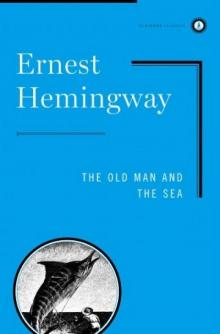 The Old Man and the Sea
The Old Man and the Sea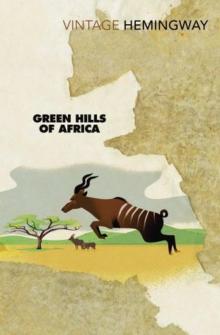 Green Hills of Africa
Green Hills of Africa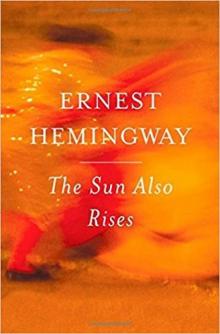 The Sun Also Rises
The Sun Also Rises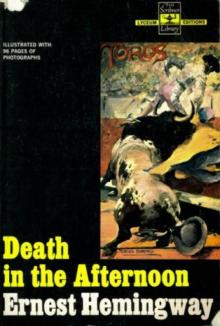 Death in the Afternoon
Death in the Afternoon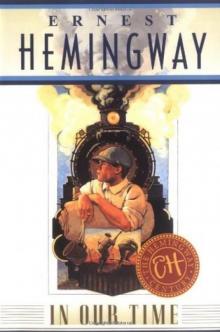 In Our Time
In Our Time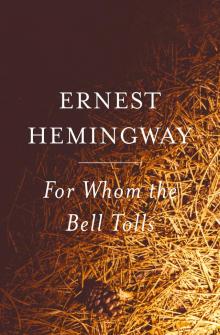 For Whom the Bell Tolls
For Whom the Bell Tolls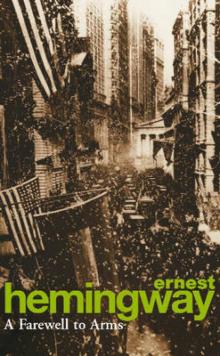 A Farewell to Arms
A Farewell to Arms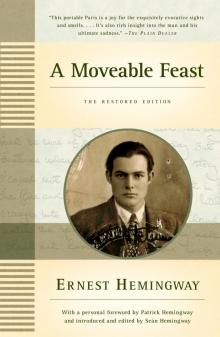 A Moveable Feast
A Moveable Feast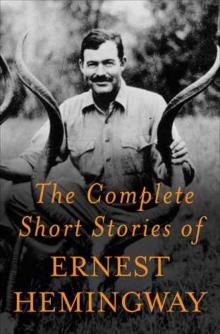 The Complete Short Stories of Ernest Hemingway
The Complete Short Stories of Ernest Hemingway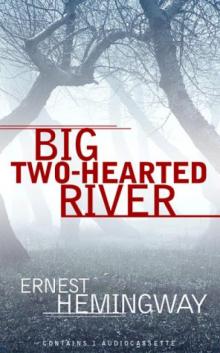 Big Two-Hearted River
Big Two-Hearted River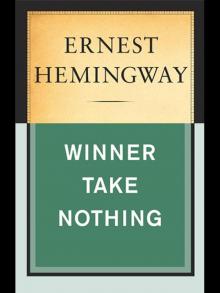 Winner Take Nothing
Winner Take Nothing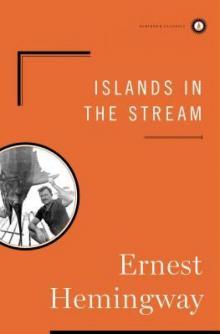 Islands in the Stream
Islands in the Stream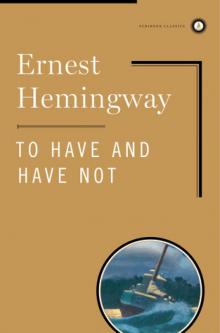 To Have and Have Not
To Have and Have Not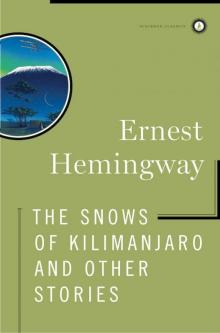 The Snows of Kilimanjaro and Other Stories
The Snows of Kilimanjaro and Other Stories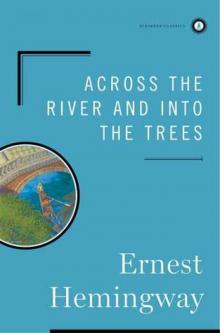 Across the River and Into the Trees
Across the River and Into the Trees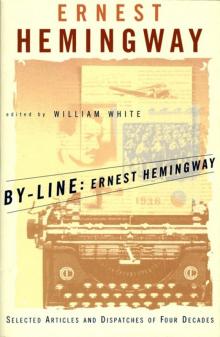 By-Line Ernest Hemingway
By-Line Ernest Hemingway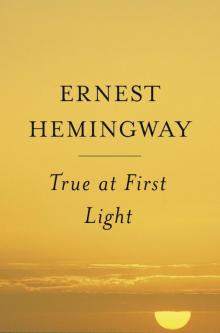 True at First Light
True at First Light Men Without Women
Men Without Women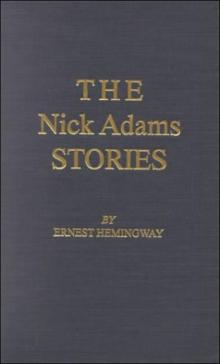 The Nick Adams Stories
The Nick Adams Stories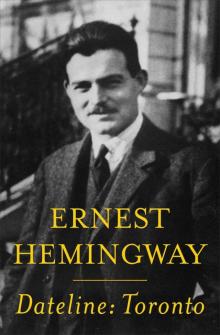 Dateline- Toronto
Dateline- Toronto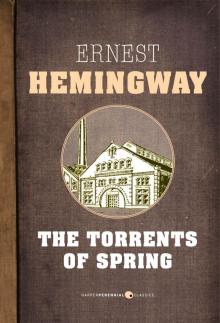 The Torrents of Spring
The Torrents of Spring Short Stories
Short Stories